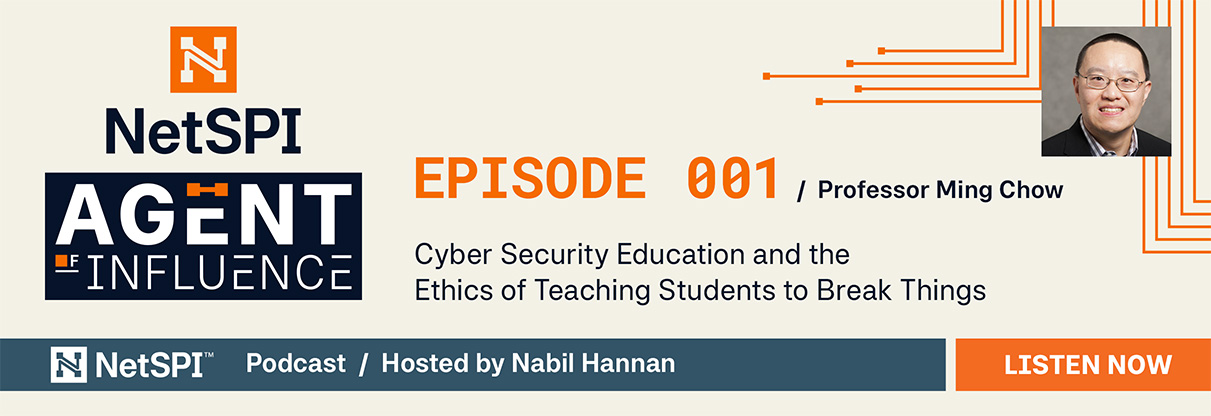
The Evolution of Cyber Security Education and How to Break into the Industry
In the inaugural episode of NetSPI’s podcast, Agent of Influence, Managing Director and podcast host, Nabil Hannan talked with Ming Chow, a professor of Cyber Security and Computer Science at Tufts University about the evolution of cyber security education and how to get started in the industry.
Below is an excerpt of their conversation. To listen to the full podcast, click here, or you can find Agent of Influence on Spotify, Apple Music, or wherever you listen to podcasts.
Nabil Hannan
What are your views and thoughts on how actual education in cyber security and computer science has evolved over the last couple of decades?
Ming Chow
I think one thing that is nice, which we didn’t have, is this: ten or twenty years ago, if we wanted to learn Java, for example, or about databases, or SQL, you had to go buy a book from your local tech bookstore or we had to go to the library. That doesn’t have to happen now. There’s just so much information out there on the web.
I think it’s both a good and a bad thing. Now, with all this information readily available, it feels like that content and information is much more accessible. I don’t care if you’re rich or poor, it really leveled the playing field in terms of the accessibility and the availability of information.
At the same time, there is also the problem of information overload. I’ll give you two good examples. Number one: I’ve had co-workers ask me, “What’s the best book to use for python?” That question, back in the day when we had physical books was a lot easier to answer. Making a recommendation now is a lot harder. Do you want a physical book? Are you looking for a publisher? Are you looking for an indie publisher? Are you looking for a website? Are you looking for an electronic form? Now, there are just way too many options.
Now it’s even worse when it comes to cyber security and information security. There are a lot of people trying to get into cyber security and a common question is how to get started. If you ask 10 experts that question, you’ll get 10 different answers. This is one of the reasons why, especially for newcomers, that it’s hard to understand where to get started. There are way too many options and too many avenues.
Nabil Hannan
Right, so people get confused by what’s trustworthy and what’s not, or what’s useful versus what isn’t.
Ming Chow
And, what makes this worse is social media because a lot of people in cyber security are on Twitter and there’s also a community on Facebook. This has both pros and cons, of course. You have community, which is great, but at the same time, there is just more information and more information overload.
But, there is one thing that hasn’t changed in cyber security education – or lack thereof – and computer science curricula since 2014. I don’t see much changed in computer science curricula at all. I still see a lot of students walking out of four years of computer science classes who don’t know anything about basic security, not to mention about cross site scripting and SQL injection. Here we are in 2020 and there are still many senior developers who don’t know about these topics.

Nabil Hannan
Let’s say you have a student who wants to become a cyber security professional or get into a career in cyber security. What’s your view on making sure they have a strong foundation or strong basics of understanding of computer science? What do you tell them? And how do you emphasize the importance of knowing the basics correctly?
Ming Chow
Get the fundamentals right. Learn basic computer programming and understand the basics. It makes absolutely no sense to talk about cyber security if you don’t have the fundamentals or technical underpinnings right. You must have the basic technical underpinnings first in order to understand cyber security. Because you see a lot of people talkabout cyber security – they talk and talk and talk – but half of the stuff they say makes no sense because they don’t have the basic underpinnings.
That’s why I tell brand new people, number one, get the fundamentals right. You must get those because you’re going to look like a fool if you talk about cyber security, but you don’t actually have any knowledge of the basic technical underpinning.
Nabil Hannan
The way I tell people, that is, it’s important for you to know how software is actually built in order for you to learn or figure out how you’re going to break that piece of software. So that’s how I iterate the same thing. But yes, continue please.
Ming Chow
Number two is to educate yourself broadly. Let me explain why that’s important. You want to have the technical underpinnings, but you also want to educate yourself broadly – take courses in calligraphy, psychology, political science, information warfare, nuclear proliferation, and others.
Educate yourself broadly, because cyber security is a very broad field. I think that’s something that many people fail to understand. A lot of people, especially in business, think that cyber security is just targeted toward technology. A lot of people think cyber security is IT’s responsibility. But of course, that’s not true, because things like legal and HR have huge implications for cyber security. You have to educate yourself broadly because sometimes the answer is not technical at all.
Nabil Hannan
I think some of the most successful people that I’ve seen in this space are usually very adaptable – they learn to adapt to different situations, different scenarios, different cultures, different environments. And, technology is always evolving and so are the actual security implications of the evolving technology. Some of the basics and foundations may still be similar, but the way to approach certain problems ends up being different. And the people who are most adaptable to those type of changing and evolving scenarios tend to be the most successful in cyber security, from what I’ve seen.
Ming Chow
I think it’s a huge misnomer for any young person who is studying and trying to get into security. Cyber security is not about the 400-pound hacker in the basement. It’s also not hunting down adversaries or just locking yourself in a room, isolating yourself in a cubicle, writing code that would actually launch attacks.
Nabil Hannan
So, you’re saying it’s not as glamorous as Hollywood makes it seem in their movies like Hackers and Swordfish?
Ming Chow
I think the most legit show is Mr. Robot because they actually vet out real security professionals for that show.
Now, I want to go back into something you said about the software engineering role. Probably one of the best ways to get into cyber security is to follow one of these avenues: software development, software engineering, help desk, network administration, or system administration. And the reason is because when you’re in one of those positions, you will actually be on the front lines and see how things really work.
Nabil Hannan
Things in practice are so different than things in theory, right? So, that’s what you really got to learn hands on.
To listen to the full podcast, click here, or you can find Agent of Influence on Spotify, Apple Music, or wherever you listen to podcasts.
Explore More Blog Posts

Extracting Sensitive Information from Azure Load Testing
Learn how Azure Load Testing's JMeter JMX and Locust support enables code execution, metadata queries, reverse shells, and Key Vault secret extraction vulnerabilities.

3 Key Takeaways from Continuous Threat Exposure Management (CTEM) For Dummies, NetSPI Special Edition
Discover continuous threat exposure management (CTEM) to learn how to bring a proactive approach to cybersecurity and prioritize the most important risks to your business.

How Often Should Organizations Conduct Penetration Tests?
Learn how often organizations should conduct penetration tests. Discover industry best practices, key factors influencing testing frequency, and why regular pentesting is essential for business security.